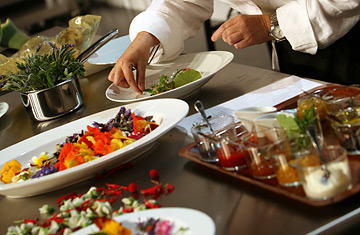
One answer may be, back to cooking's roots. "Last year, Madrid Fusion was all about machines, and two years before that, it was about chemicals," says Antoinette Bruno, editor-in-chief of Starchefs, an influential chef's magazine. "This year is the return to flavor." Several speakers at the conference concurred. Montse Estruch, of the Catalan restaurant El Cingle, boosted the taste of a beautifully presented San Peter's fish with a handful of violet petals. In a talk that drew on his own experience raising animals and vegetables for his Blue Hill restaurants in New York, chef Dan Barber generated buzz with a discussion of why allowing lambs to graze on grass is not only better for the environment and for the animals than grain feeding them, but produces more succulent meat. And Santi Santimaria, of Barcelona's Can Fabes, reproached his colleagues for their constant pursuit of the vanguard. "We're a gang of frauds who work to distract snobs," Santamaria said, before issuing his own manifesto: "The only truth that matters is the product that comes out of the earth, passes through the ovens to the mouth of the eater, and is then defecated."
Santimaria got a standing ovation. But however much the audience may have loved his diatribe on behalf of nature and artisans, they were still hungry for technological novelty. Seiji Yamamoto, of Tokyo's Ryugin, got an ovation of his own for the squid-ink "barcode" he silk-screened onto a plate, which, when scanned, leads the PDA-toting diner to a website that explained the dish's ingredients. Juan Mari Arzak used a nifty device to puff up cellophane 'papillote' with herb-scented air that would then infuse the lobster cooked inside. Quique Dacosta created mushroom "papers"; Dani Garcia used liquid nitrogen to turn olive oil into butter lingots ; and Eneko Atxa centrifugally pulled apart broths to reveal three different "essences."
Adri, head chef at El Bulli and the godfather of all this conceptual kitchen wizardry, reflected on the direction of the movement he spawned. In a long, almost evangelical Powerpoint demonstration, he urged chefs to learn even the chemical makeup of the products with which they cook. Then, he showed off a few new tricks of his own. Using a "spherification" process of wrapping it in an algae-based membrane, he turned olive oil into tiny, transparent pearls mimicking caviar. Afterwards, though, he displayed a superhero's circumspection about his work: "We're caught in a madness for the new," he said, "and it's my fault."
The world's other star molecular gastronomist, Heston Blumenthal of London's Fat Duck, largely avoided the question of technology versus taste, instead focusing on a new element in his ongoing quest to generate emotion through food. He introduced a new reservation system for his restaurant that involves a website tour and aromatizers filled with candy scents. It's all part of a plan to create excitement even before the client walks in the restaurant door. "The one thing I want a customer to say is that they had fun," said Blumenthal.
Fun? Defecation? For Barber, a first-time visitor to Madrid Fusion, the experience was confusing. "I keep asking myself 'What are we doing here? Isn't this effete, precious, egotistical?' But then I see these guys like Quique [Dacosta], [Joan] Roca, and Adri, and they're so knowledgeable and passionate and energized," Barber says. "I can't decide: Where's the brilliance, and where's the gimmick?"
